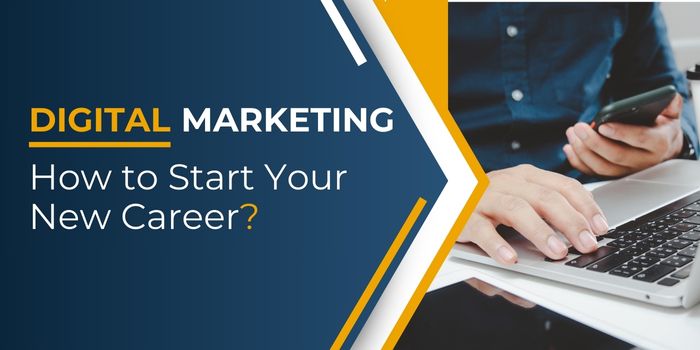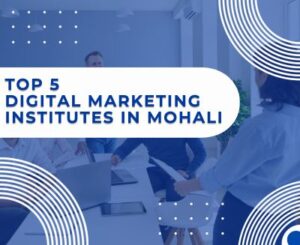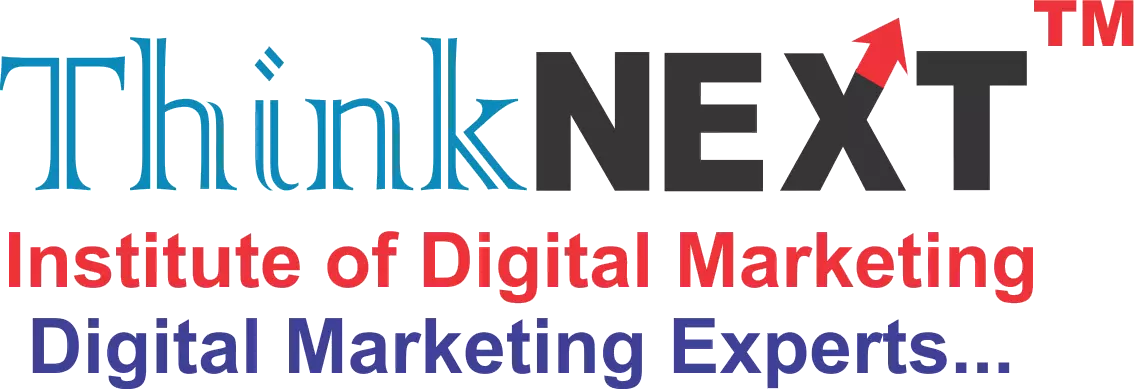
Top 10 Digital Marketing Institutes in India
Top 10 Digital Marketing Institutes in India Quick Enquiry Welcome to the world of


Marketing has also evolved in today’s digital age, where technology and the internet have become an integral part of our lives. Traditional marketing methods are no longer as effective as they used to be, and businesses are now turning to digital marketing strategies to reach their target audience. If you’re looking to start a new career or enhance your existing skills, digital marketing is a field worth considering.
In this blog post, we will explore what digital marketing is, why you should learn it, and the various topics covered in digital marketing.
Digital marketing uses digital channels, such as websites, social media platforms, search engines, email, and mobile applications, to promote products or services. It involves various techniques and strategies to reach and engage with the target audience in the online space. Digital marketing encompasses various activities, including search engine optimization (SEO), content marketing, social media marketing, email marketing, pay-per-click (PPC) advertising, and more.
Digital marketing encompasses a wide range of topics and disciplines. Here’s a comprehensive list of key topics and subtopics covered within the field:
1. Introduction to Digital Marketing:
– Basics and evolution of digital marketing
– Digital vs. traditional marketing
2. Website Development and Design:
– Website platforms (e.g., WordPress, Joomla, Drupal)
– UX/UI (User Experience/User Interface) principles
– Mobile Optimization
– Landing page optimization
3. Search Engine Optimization (SEO):
– On-page SEO (meta tags, content optimization, internal linking)
– Off-page SEO (backlinking, guest posting)
– Technical SEO (sitemap, robots.txt, site speed)
– Local SEO
– Keyword research and analysis
– SEO tools and analytics
4. Search Engine Marketing (SEM) and Pay-Per-Click (PPC):
– Google Ads
– Bing Ads
– Ad campaign creation and optimization
– Ad groups, keywords, and ad copy
– Quality Score and Ad Rank
– Conversion tracking
5. Content Marketing:
– Content creation (blogs, videos, infographics)
– Content strategy and planning
– Content promotion and distribution
– Storytelling and branding
6. Social Media Marketing (SMM):
– Major platforms (Facebook, Instagram, Twitter, LinkedIn, Pinterest, etc.)
– Social media strategy and content calendars
– Paid advertising on social platforms
– Engagement, analytics, and reporting
– Social media tools and automation
7. Email Marketing:
– Email platforms (e.g., Mailchimp, Constant Contact)
– List building and segmentation
– Designing email campaigns
– A/B testing
– Tracking and analytics
8. Affiliate Marketing:
– Understanding affiliate networks
– Promoting affiliate products
– Earning models and commission structures
9. Online Advertising:
– Display ads
– Native ads
– Programmatic advertising
– Remarketing and retargeting
10. Analytics and Data Analysis:
– Google Analytics
– Key performance indicators (KPIs)
– Tracking conversions and ROI
– A/B testing and optimization
11. E-commerce Marketing:
– E-commerce platforms (e.g., Shopify, WooCommerce)
– Product listing and optimization
– E-commerce advertising and promotion
– Shopping cart abandonment strategies
12. Mobile Marketing
– App Store Optimization (ASO)
– Mobile advertising and ads platforms
– SMS marketing
13. Online Reputation Management:
– Monitoring brand mentions
– Handling negative feedback
– Building a positive online presence
14. Video Marketing:
– YouTube marketing and optimization
– Video creation and editing
– Video promotion strategies
15. Influencer Marketing:
– Finding and collaborating with influencers
– Platforms and tools for influencer marketing
– Measuring influencer campaign success
16. Marketing Automation:
– Platforms and tools (e.g., HubSpot, Marketo)
– Lead scoring and nurturing
– Campaign automation
17. Digital Marketing Strategy and Planning:
– Setting goals and objectives
– Creating a digital marketing plan
– Budgeting and forecasting
This list provides an overview of the main topics within digital marketing, but the field is vast and constantly evolving. Each topic can be delved into deeply, and there are constantly emerging trends and technologies to watch.
Learning digital marketing is valuable for various reasons, both for individuals and businesses. Here are some compelling reasons why one should consider learning digital marketing:
The digital landscape is expanding rapidly. As businesses recognize the importance of having an online presence and the potential for reaching a global audience, the demand for skilled digital marketers is increasing.
The digital marketing sector offers diverse roles, from SEO specialists and content creators to data analysts and PPC managers. These roles are in high demand and can lead to rewarding careers.
Digital marketing can be a more cost-effective promotional strategy for businesses than traditional marketing. Knowing how to strengthen online channels can maximize return on investment.
One of the most significant advantages of digital marketing is its measurability. With tools like Google Analytics, marketers can see in real-time what’s working and what’s not, allowing for timely adjustments.
The business landscape is becoming increasingly digital. Even if you’re not directly in a marketing role, understanding the digital marketing world can be beneficial for staying relevant in various professional settings.
Digital marketing skills can be applied across industries, from e-commerce and tech to healthcare and education. This offers flexibility in terms of career choices.
The digital nature of the work allows many digital marketing professionals to work remotely or even start their own freelance or consulting businesses.
Today’s consumers are online. They search for information, shop, and engage with brands on digital platforms. Understanding digital marketing allows businesses to meet their customers where they are.
The digital world evolves rapidly. By diving into digital marketing, you’re committing to continuous learning, ensuring you’re continuously updated with the latest trends and technologies.
Digital marketing often requires a mix of analytical and creative thinking. Whether designing a campaign, writing compelling copy, or interpreting data, numerous opportunities exist to enhance and employ your creative skills.
For business owners or entrepreneurs, understanding digital marketing can directly impact the growth and success of their business. Knowing how to effectively reach and engage an audience online can lead to increased sales and brand loyalty.
In the business landscape, those who leverage digital marketing effectively often have a competitive advantage over those who don’t. Proficiency in digital marketing strategies can set you or your business apart.
As the digital landscape continues to evolve, the demand for skilled digital marketers has skyrocketed. Whether you’re a recent graduate looking to kickstart your career or a professional seeking to upskill, choosing the right institute for digital marketing is crucial to ensuring you receive a quality education that sets you up for success. In this comprehensive guide, we’ll walk you through the key factors to consider when selecting the best institute for your digital marketing journey.
Begin your search by looking for institutes that are accredited and have a solid reputation in the field of digital marketing. Accreditation ensures that the institute meets certain standards, guaranteeing a high-quality education. Additionally, research the institute’s reputation by reading student reviews and testimonials to gauge the experiences of their past students.
Evaluate the institute’s course curriculum to ensure it covers all the essential aspects of digital marketing. Look for a comprehensive syllabus that includes social media marketing, search engine optimization (SEO), content marketing, email marketing, analytics, and more. A well-rounded curriculum will equip you with the necessary knowledge and skills to excel in the digital marketing industry.
Find out if the institute has a team of experienced industry professionals as faculty members. Expert instructors with hands-on experience in the field can provide valuable insights and practical knowledge beyond theoretical concepts. Check if the institute brings in guest lecturers or industry experts for workshops and seminars, which can greatly enhance your learning experience.
Digital marketing is a hands-on field, so choosing an institute that provides ample opportunities for practical training is crucial. Look for institutes that offer live projects or internships, allowing you to apply your knowledge in real-world scenarios. Practical training will give you a competitive edge and help you build a portfolio of work that showcases your skills to potential employers.
Consider the institute’s track record regarding placements and the strength of its alum network. A reputable institute will have strong connections with industry leaders and provide its students with career guidance and placement assistance. Check the success rate of previous batches regarding job placements and the profiles of alums who have excelled in the industry.
Visit the institute or explore its website to learn about its infrastructure and learning environment. A conducive learning environment with modern facilities, well-equipped classrooms, and access to the latest tools and technologies is essential for a comprehensive learning experience. Also, consider factors like class size, student-to-faculty ratio, and the overall atmosphere of the institute.
Evaluate the institute’s flexibility and convenience factors, such as class timings, course duration, and the availability of online learning options. If you’re working or have other commitments, choosing an institute that offers flexible schedules or online courses that allow you to learn at your own pace is important.
While cost should not be the sole determining factor, it’s important to consider the fees and overall return on investment. Research the market rates for digital marketing courses and compare them with the institute’s fees. Remember, the quality of education and opportunities for practical training should be your top priority, as they directly impact your future career prospects.
In today’s rapidly advancing digital era, mastering digital marketing is both essential and advantageous. Whether an entrepreneur, a seasoned professional, or a business novice, this skill can redefine your career trajectory. The right educational institute is paramount in this journey. Consider factors like curriculum, expertise, real-world training, and placements. The TIDM Institute for Digital Marketing, renowned for its exceptional track record, offers a holistic and transformative learning experience in the digital domain. Make a strategic investment in your education with the right institution and harness the limitless potential of the digital marketing realm.

Top 10 Digital Marketing Institutes in India Quick Enquiry Welcome to the world of

The Power of SEO in Today’s Digital Age Quick Enquiry Introduction In today’s digital

Why TIDM is the Leading Institute for Digital Marketing Education Quick Enquiry In the

Top 5 Digital Marketing Institutes In Mohali Quick Enquiry Welcome to the digital marketing

Top 5 Benefits of AI in Digital Marketing Quick Enquiry In recent years, artificial
Adress: S.C.F. 113-114,Second Floor, Sector-65, Phase-11, Mohali (Chandigarh)
Phone: 95777-04000
Whatsapp: 95777-04000
